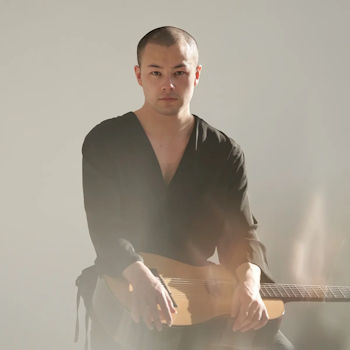Recording of the Week,
Sean Shibe's Camino
It’s perhaps understandable that several of today’s leading guitarists have a slightly ambivalent relationship with Spanish music, given that the ubiquity of the Rodrigo concerto and solo works like Tárrega’s Recuerdos de la Alhambra and Albéniz’s Suite española has arguably eclipsed other corners of the instrument’s repertoire; Miloš Karadaglić touched on this in our interview earlier this year, and Sean Shibe ruefully observes that ‘it took a global pandemic’ to overcome his reticence about recording a Spanish album in the booklet-note for today’s Recording of the Week.
But Camino (released today on Pentatone) is no collection of clichés, partly because Shibe has chosen to explore cross-cultural connections between France and Spain rather than focusing solely on the latter country. The journey begins with the ‘Danza del molinero’ from de Falla’s ballet El sombrero de tres picos, which wears its Spanishness more overtly on its sleeve than the other works on the programme, yet even here Shibe subverts expectations from the off: another artist might be tempted to despatch that arresting opening chord with splashy flamboyance, yet in Shibe’s hands it takes on an austere, arid beauty which immediately announces that this musical journey through Spain is going to be more akin to a pilgrimage than a package-tour.
 Then the first of the album’s many tiny miracles emerges: the infinite variety with which Shibe handles the many repetitions of the three-note phrase after the opening chord is a little masterclass in creating a whole spectrum of colours and shapes from the simplest of materials, and confirms that this is a recording which will compel your undivided attention for the next hour. Like several of the composers who feature on the programme, Shibe is a miniaturist par excellence, but nothing he does sounds micromanaged or pre-planned – instead, it feels like a meditation in which intense focus on a single object gives rise to all manner of spontaneous transformations.
Then the first of the album’s many tiny miracles emerges: the infinite variety with which Shibe handles the many repetitions of the three-note phrase after the opening chord is a little masterclass in creating a whole spectrum of colours and shapes from the simplest of materials, and confirms that this is a recording which will compel your undivided attention for the next hour. Like several of the composers who feature on the programme, Shibe is a miniaturist par excellence, but nothing he does sounds micromanaged or pre-planned – instead, it feels like a meditation in which intense focus on a single object gives rise to all manner of spontaneous transformations.
The delicacy and introspection of Shibe’s playing continues to beguile throughout the rest of the piece (and indeed the programme), with every shift in timbre and tempo unfolding organically – the accelerando towards the end of the de Falla, for instance, feels like an entirely natural progression rather than a grandstanding bolt towards the finishing-line. Transitions between pieces, too, are so seamless that there were several moments where I only registered the change after glancing at my display-screen, the segue from Antonio José’s Pavana triste into the first of several works by Federico Mompou being a case in point.
The José itself is a real gem, amply illustrating why Ravel declared that he would emerge as ‘the Spanish composer of our century’ (a prediction which tragically never came to pass – like Federico García Lorca, José was executed in the early days of the Spanish Civil War aged 33). Shibe, who adored the entire sonata in his teenage years, clearly still loves this particular movement despite having developed misgivings about the rest of the piece, and the sense of line he creates here would surely be the envy of many a bowed string-player.
It’s Mompou who’s allocated the lion’s share of the programme, and Shibe’s decision to juxtapose selections from his Cançons i danses (most of which were originally written for piano) with Satie’s Gymnopédie No. 1 and two Gnossiennes is an illuminating one, emphasising both the kinship and contrasts between the two composers and giving him ample opportunity to embrace that meditative stillness which makes this album so special. [Since this article was published we have been made aware that the three Satie tracks are not included on the digital album.]
Mompou’s eighteen-minute Suite Compostelana (written for Andrés Segovia in the 1960s) is the most substantial work on the album, and Shibe seems to tap into its strange beauty even more than its dedicatee did, revelling in the hymn-like gravitas of the Coral and imbuing the lovely Cuna (Lullaby) with an exquisite singing tenderness. The more rumbustious closing Muñeira, too, is beautifully done, the slight astringency of Shibe’s new instrument (a Michael Gee guitar which he acquired last year) paying dividends in terms of clarity as the guitar imitates the drone of Galician bagpipes.
Overall, then, this is yet another indispensable album from one of today’s most thoughtful and original young artists – I warrant you’ll revisit it time and again, discovering new riches on every hearing.
Sean Shibe (guitar)
Available Formats: CD, MP3, FLAC, Hi-Res FLAC, Hi-Res+ FLAC



